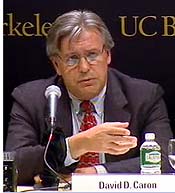UC Berkeley Point of View
The rules of war: Emergency rule leaves us morally ill at ease
By David D. Caron, Boalt Hall School of
Law |
15 June 2004
On
Tuesday, June 15, the San Francisco Chronicle's Open
Forum section published two opposing op-ed pieces by
professors from UC Berkeley's Boalt Hall School of Law.
The Chronicle
asked David D. Caron and John C. Yoo to argue why the
United States should or should not continue to recognize
and conform to the international conventions on warfare.
Americans' sense of morality, our belief
that we are fighting "a good war,'' depends on our understanding
of the rules. The primary question is, Are the current
rules of war ill-suited to the war on terrorism?
David D. Caron is the C. William Maxeiner distinguished professor of international
law at UC Berkeley's Boalt Hall School of Law. He is a graduate of the U.S.
Coast Guard Academy and served from 1997 to 2003 on the United Nations Compensation
Commission for claims arising from the 1991 Persian Gulf War. Caron's op-ed
response to the Chronicle's question has been reprinted below. (Read
John Yoo's answer: "Sept.
11 has changed the rules.")
Terrorism, and the U.S.-led global war on it, requires new rules, but not the ones you might think. Threats to society fall within one of three legally defined boxes:
 |

David Caron
|
Emergency laws employed in many nations have two common, noteworthy characteristics: indefinite detention of persons without charge or recourse to courts and harsh interrogation. About emergency law, we know that although "emergency" is often stated to be a temporary measure, it tends to become permanent, is used for purposes other than the original emergency and leads to grave abuses of human rights.
It is critical to recognize that the Bush administration's response to the Sept. 11 terrorist attacks is in essence the implementation of a global state of emergency. Within the United States, emergency was not declared, but new law-enforcement and intelligence powers were authorized under the Patriot Act, and U.S. citizens were detained without charge indefinitely. Outside of the United States, the administration has stated that it would use force against not only existing but also what it perceives to be emerging threats, thus giving itself authority to use force more assertively.
Furthermore, the administration's decisions (1) to place detainees at Guantanamo Bay, Cuba, which it contends is outside the reach of U.S courts, (2) to declare that the Geneva conventions do not apply to militias fighting for the Afghanistan Taliban government and (3) to reinterpret numerous international obligations - including those relating to torture - in astonishingly narrow ways all point to the objective of placing the global war on terrorism in neither the law-enforcement nor war boxes, but rather the category of emergency rule.
All laws need to be updated to deal with new situations. But to say that changes to the laws of the war may be needed misses (and even deflects the focus from) the point. The Bush administration clearly has been willing to operate outside either the law enforcement or war boxes. (It is worth recalling that before Sept. 11, the consistent message of the United States to Britain regarding Northern Ireland and to India regarding Kashmir was that they show restraint, address the roots of terrorism and utilize the law enforcement, rather than the emergency rule, box.)
We must take care not to put intellectual window dressing on a war that seeks in many instances to be free of law. Perhaps the laws of war or our civil liberties could be fundamentally reconstructed to allow more responsive and aggressive use of force in the case of terrorism. But three concerns arise:
A moral society acknowledges that emergency rule may be required in extraordinary circumstances, but it also regards such concentration of power as suspect and dangerous. In this sense, we need to circumscribe strictly the scope of the terrorist danger that the extraordinary power of emergency rule seeks to address. We should ask how long the emergency will last, who will decide it has ended, who will police the exercise of emergency power, and what limits are to be placed on its exercise.
It is our responsibility to protect our fellow citizens from the dangers posed by terrorists. It likewise is our responsibility to ask these questions before the addictive ease of global emergency rule renders such rule permanent and its corrupting grant of power yields even more and greater abuses of the human rights we value as a nation. Make no mistake, we will never feel morally at ease with emergency rule.
Read
John Yoo's answer: "Sept. 11 has changed the rules."

